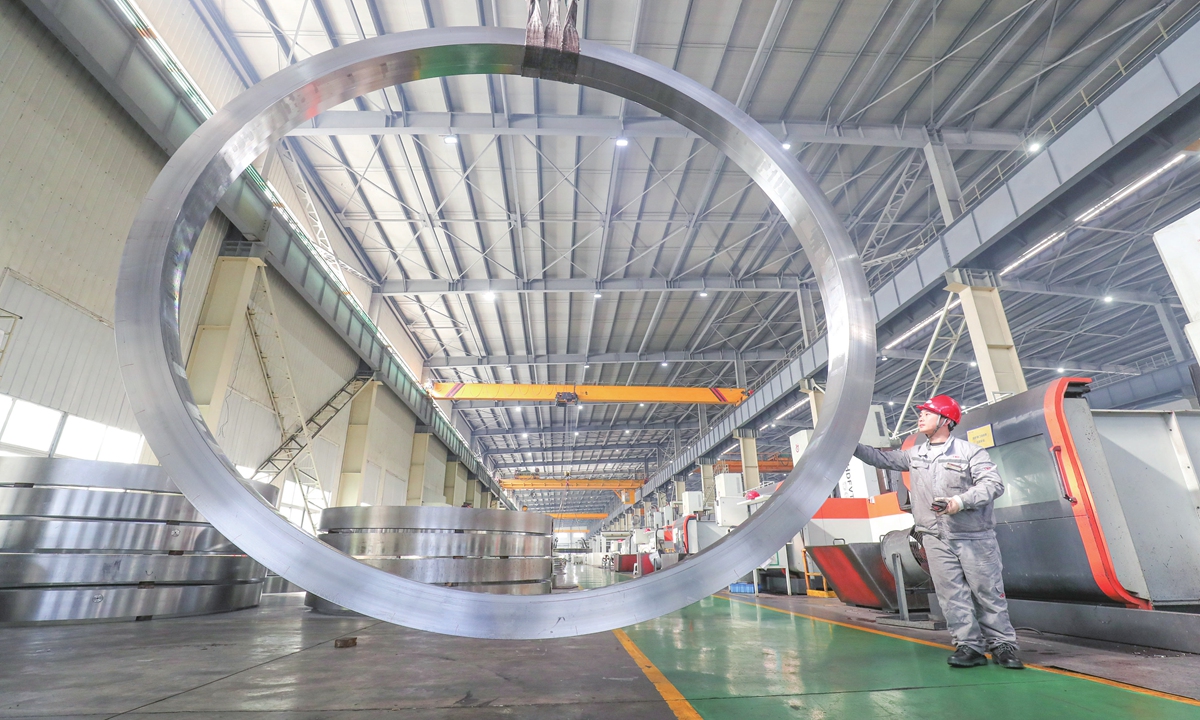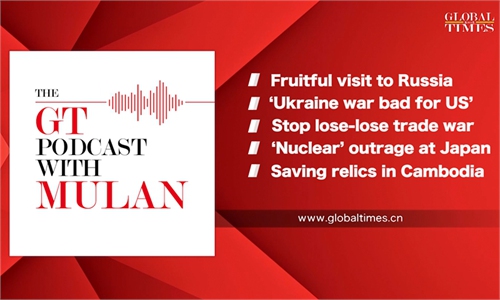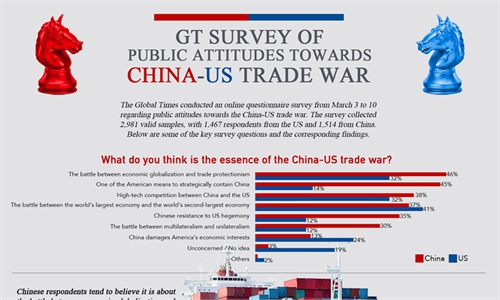Nearly 60% of US respondents believe US-launched trade war against China hurts US: GT poll
Business community, consumers call for cancelation of punitive tariffs: survey

A worker checks wind turbines at a local production workshop for exports to the US on January 30, 2023 in Huzhou, East China's Zhejiang Province. Photo: VCG
The US trade war on China launched by former US President Donald Trump and carried on by the Biden administration has largely failed, and pushed China to ratchet up its innovation capacity, showed a survey conducted among 2,981 respondents from China and the US, including 988 employees (of which 338 hold management positions) at companies related to China-US trade.
Nearly 60 percent of US respondents believed that the trade war has negatively affected the US, while 53 percent of Chinese respondents thought that the trade war has adversely impacted China, according to a survey conducted by the Global Times Research Center.
A significant number of respondents - over 40 percent on the Chinese side and nearly 30 percent on the US side - believe that the tariffs should be scrapped, according to the survey, as the China-US trade war marks its 5th anniversary in March.
The US launched a trade war against China in March 2018 and today there are still tariffs placed on more than $300-billion worth of Chinese goods that have not been cancelled. China, in turn, levied its own tariffs on some US goods as a countermeasure.
No success in containing China
Surveyed Chinese respondents believed that the US has 33 percent of possibility in successfully containing China through the trade war, whereas the US respondents believed the country has 52 percent possibility for the success, the survey showed. In the meantime, 53 percent of responders from China and 39 percent from the US say the trade war has ramped up homegrown innovation capacity in both countries.
Chinese experts said the US launched the trade war against China with the goal of checking Chinese development, by unilateral measures against multilateral rules, and focusing on high-tech sectors as the main battlefield.
He Weiwen, a senior fellow at the Center for China and Globalization, told the Global Times on Sunday that, while the short-term "success rate" of technology curbs and bans, and investment restrictions is relatively high, the long-term results may look completely different.
"In the long run, as long as China's responses are effective, the 'success rate' in the above-mentioned field will decrease, and some US curbs will yield results contrary to the desired effect, which will be a failure for the US," He said.
Who bears brunt of trade war?
The survey also showed that some 59 percent of Chinese respondents working in companies related to China-US trade said the trade war has slashed their companies' annual revenue by some 30 percent, while just 38 percent of their US counterparts reported a similar finding. And 37 percent of US respondents engaged in China-US trade say revenue loss was above 30 percent.
On March 15, the US International Trade Commission (ITC) released a report which stated that the punitive US tariffs imposed under Section 301 on imports from China had reduced the country's imports of those products and increased its production and prices.
The report found that, on average, from 2018 to 2021, US importers bore nearly the full cost of the tariffs because import prices had increased at the same rate as the higher tariffs.
Gao Lingyun, an expert at the Chinese Academy of Social Sciences in Beijing, told the Global Times on Sunday that the findings by the survey and the ITC are in line with a series of research studies done by both Chinese and American institutions dating back to 2019, and the US side roughly bore 90 percent of the burden caused by the tariffs.
The report by ITC, a semi-official organization in the US, indicates that the US government is starting to pay attention to the issue, Gao said.
Gao noted that the trade war has had widely varying impacts on different consumer groups, and some findings are far from people's expectations. For instance, travel luggage, which is traditionally seen to be a labor-intensive category, has proved to be very difficult to substitute due to the industry-specific technology used in the industry.
Also, 60 percent of respondents from China and 61 percent from the US believe that the China-US trade war has negatively impacted the world, according to the survey.
Call for removing tariffs
The Global Times survey also found a rising chorus of calls to scrap the tariffs. Over 40 percent of respondents in China agree that "now is the time to cancel tariffs placed on Chinese goods." Some 40 percent respondents in favor of the opinion was found in respondents who held management position while a slightly higher percentage was found among management-position respondents whose companies actually engage in China-US trade. In the US, 27 percent of those surveyed said tariffs should be removed.
Gao said that, as far as the US is concerned, it seems that during the trade war, no one has gained from the high tariffs while a lot of unnecessary losses have been accrued by broad consumers, and the welfare of producers has suffered. "It might be a good idea that the two sides create some conditions and opportunities to seek to cancel these additional tariffs," Gao said.
Gao said if both sides maintain a reasonable attitude, there may be some progress in dialing back the trade war.
The Chinese Ministry of Commerce (MOFCOM) on Thursday called on the US government to cancel all additional tariffs imposed on China as soon as possible, and work with the Chinese side to maintain the stability of global industrial and supply chains for the benefit of the two peoples and the world.
The MOFCOM cited a WTO panel ruling that concluded that US' measures of levying high tariffs violated WTO rules and urged the US to listen to all sectors in its domestic community and respect the WTO panel's ruling.
Trade experts said it is a certainty that if the tariffs are removed, the scale of China-US trade volume will obviously be larger.
Gao said that, if the restrictions on electronics trade are slightly relaxed, the scale of bilateral trade will increase significantly, and such a move will increase confidence among the two countries' business circle and the consumers as well.
"With improved trade, better investment flows, and lower prices, the inflationary pressure in the US will be reduced, and the pressure on the Federal Reserve to raise interest rates will drop," Gao said.



